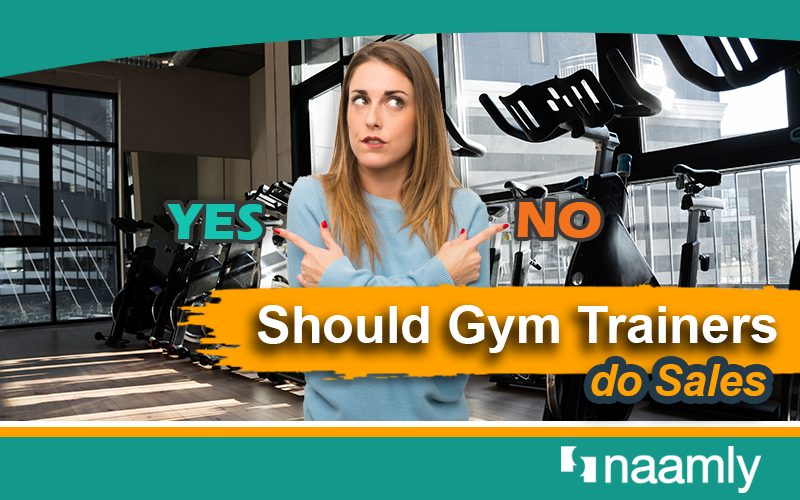Sales are the lifeblood of any fitness business. You can have the best programming and the nicest facility in town, but if you don’t convert leads into paying members, it’s hard to keep the lights on, let alone grow.
One of the most common questions gym owners face is: Should gym trainers do sales, or should I hire a dedicated salesperson?
At Naamly, we work with gyms of all shapes and sizes, and we’ve seen both approaches succeed and fail. The right answer depends on what kind of gym you have, considering your gym’s size, business model, and team structure. In this post, we’ll help you answer that question based on your goals, team capacity, and client experience.

Option 1: Should Gym Trainers Do Sales?
In many gyms, personal trainers are already expected to sell. Their income is often tied to how many clients they bring in and retain. So, when owners ask should gym trainers do sales, the truth is — they probably already are.
Pros:
- Personalized Approach: Trainers already understand client goals and can build trust quickly. This can lead to better conversions, especially in relationship-driven businesses like fitness.
- Lower Overhead: You avoid adding new payroll costs by having your existing team handle lead calls, consultations, and follow-ups.
- Trainer Motivation: If trainers earn commission or bonuses, they have powerful motivation to work on sales.
- Consistent Journey: Sometimes, when the same person who sells the service is also delivering it, the client has a smoother experience.
Cons:
- Time and Energy: Juggling coaching with sales follow-ups can stretch your team thin. Some might be inconsistent with follow-ups. They can drop leads. Should gym trainers do sales? Not if they’re already all booked and you want them to keep clients happy.
- Lack of Training: Just because someone is a great trainer doesn’t mean they know how to sell – or should have to learn.
- Lack of Focus: If a trainer is fully booked with clients, he might not make sales a priority. He can suffer from a lack of clarity about expectations: “Am I supposed to train Mr. Johnson to the best of my ability, or just train him enough so I can also sell these other people over here?”
- Reality Check:
If you’re wondering should gym trainers do sales, consider whether you want them to be gym employees or independent contractors. Maybe it’s best for you to keep them as independent contractors responsible for their own book. Or maybe you’d rather have them as employees so you can have more control over their sales responsibilities.
Remember that, either way, any trainer working in your gym is a reflection of your business. Referrals are everything in fitness, and the general public might not know or care if Trainer Joe actually works for you or just rents space. The point is: You need alignment on some principles regardless, no matter how you answer, “Should gym trainers do sales?”
Option 2: Hiring a Dedicated Salesperson or Team
If you want to grow aggressively, or if you’re starting a gym under a certain team structure, then it might make more sense to separate your sales work and give those responsibilities to professional salespeople. You’re answer to “Should gym trainers do sales” might turn to a yes.
Philosophically, you wouldn’t expect a salesman to program fitness routines, right? So why expect a trainer to be an excellent salesperson?

Pros:
- Laser Focus: Salespeople do one thing — close deals. That kind of specialization can drive faster growth.
- Sales Skills: A trained sales rep knows how to overcome objections, qualify leads, and follow up strategically. Selling and training are two separate jobs, after all.
- Accountability: If you’re clear about key performance indicators and other expectations, it can be simple to track performance and make adjustments as needed.
Cons:
- Cost: Hiring and onboarding a full-time salesperson is an investment. You’ll need to budget for salary, commission, and support tools, and maybe even benefits.
- Turnover Risk: Sales roles can be high-pressure, with a high burnout factor to go along with it.
- Potential Culture Clashes: If the sales approach feels disconnected from your gym’s brand, it could affect your reputation. Do you want the aggressive tactics of a stereotypical “used car salesman,” or a soft approach of fitness and wellbeing adviser?
Key Factors to Help You Decide
To truly answer should gym trainers do sales, consider these essential questions:
1. Are your trainers employees or renters?
If they’re employees, you can bake sales into their jobs and train them to sell exactly the way you want them to sell. If they’re independent contractors, they’re focused on building their own list of clients – so, you’ll need another plan for selling gym memberships.
2. How big is your gym?
Smaller gyms often thrive with a trainer-led sales model. The gym’s personality and the trainer’s are often the same, and some customers really like that approach. But for larger gyms with tons of leads and automated sales funnels, you will need a dedicated team to keep up and make the most of the opportunities.
Should gym trainers do sales? Size matters!

3. Are your sales numbers where they need to be?
In other words: Is your current system working – or not? Let’s say you answer yes to the question, should gym trainers do sales. But what if you’re consistently missing your sales goals, no matter how much pressure you’re applying to your trainers. It might be time to bring in a sales professional or a team.
4. What’s your budget?
A full-time hire may not be realistic if you’re just starting out. In that case, can you hire someone part-time or on a commission-only basis? Poll your staff – maybe you have a trainer who’s itching to develop sales experience.
5. What type of customer experience do you want to offer?
At a boutique studio, prospects might want to connect with a coach from the start. At larger gyms with standardized services, the expectations are probably different. So, know your avatar and what you intend to provide for them when you wonder should gym trainers do sales.
For a boutique experience, prospects may appreciate connecting with a coach right away. For larger gyms with standardized offerings, a trained sales team may be better equipped to walk them through options and get them started.
Two Possible Scenarios
Let’s imagine two gyms, one who says yes to the question, should gym trainers do sales, while the other relies on sales professionals.

Example 1: Trainer-Led Sales at Elevate Fit Co.
Elevate Fit Co. is a boutique studio offering small-group training. The owner, Mike, believes in empowering his trainers to handle sales because they’re already interacting with clients and building trust from Day 1.
His team tracks leads, schedule intro sessions, and follow up consistently. He provides regular sales training so his coaches feel confident in their role.
Why it works:
- Tight-knit community vibe
- Lower lead volume
- Coaches comfortable with selling
For Mike, the answer should gym trainers do sales is a resounding yes — with training, tools, and a culture of support.
Example 2: Dedicated Salesperson at Summit Strength
Summit Strength is a larger facility with high monthly lead volume. Rachel, the owner, hired a full-time salesperson to ensure every lead was followed up with quickly and professionally.
Her sales rep handles lead intake, conducts discovery calls, and nurture prospects through follow-ups. Once a client signs up, the coaching team takes over.
Why it works:
- High volume of inquiries
- Trainers focused purely on coaching
- Professional, structured sales process
When Rachel considered, should gym trainers do sales, the answer was no — not with the volume she needed to manage and the level of service she wanted her trainers to maintain.
If you’re wondering should gym trainers do sales, remember that Naamly gives you the communications systems and tools to make that decision easier — and to support either model. Call us today for your initial consultation.
Final Thoughts: Should Gym Owners Doi Sales
We’re back to the original question, and here’s the short answer:
It depends!
The answer is YES, if:
- You’re a smaller gym
- Your trainers are employees
- They’re coachable and open to learning sales
- You want to keep costs low and build strong client relationships
It’s probably NO, if:
- Your trainers rent space and aren’t part of your sales pipeline
- You’re handling tons of leads
- You need a more structured or aggressive sales process
- You want your coaches focused entirely on training and retention
Whichever direction you go, remember this: clients buy experiences, not just memberships. Whether the conversation starts with a coach or a closer, the focus should always be on helping prospects feel supported, understood, and excited to start. And when you’re ready to hire a new trainer, be sure to consult our free guide “12 Places to Hire Your Next Star Trainer.”


